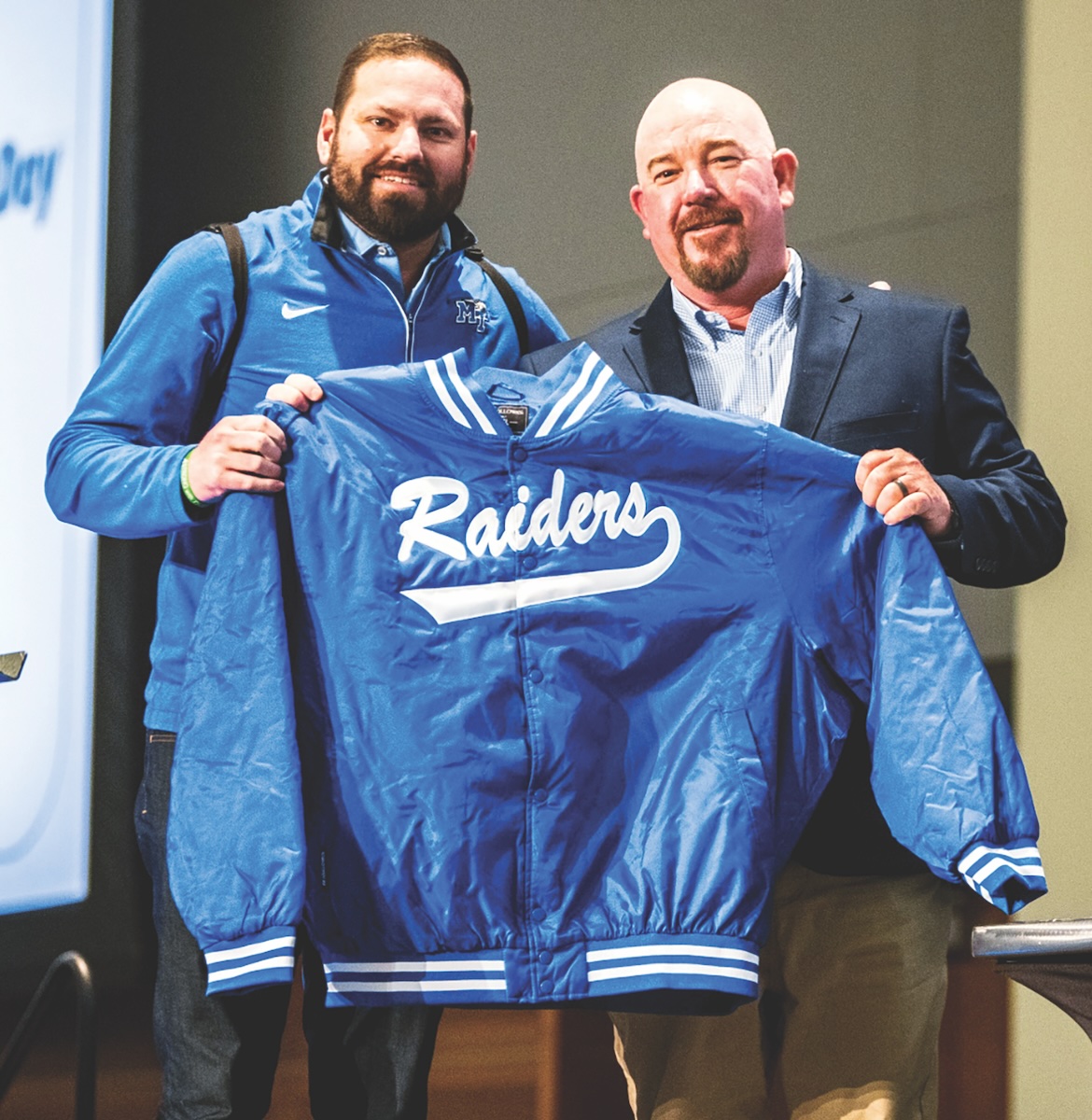
11 minute read
Business as Unusual
MTSU’s Innovation and Entrepreneurship program not only prepares students to become their own bosses, but also equips them with essential skills to climb any career ladder
by Allison Gorman
One day in 2018, Tyler Burnett’s side gig—laying artificial turf—turned into his main gig. He’d landed his first big job, designing and installing a backyard putting green. But he hadn’t launched his business yet. It didn’t even have a name.
He googled “animals that graze grass.”
“Goat was the third thing that came up,” he said. “Baseball guys, we’re pretty superstitious, and my number at MTSU was 3, so that just jibed well. I met my wife at a restaurant called The Goat in Murfreesboro. And then I’ve always wanted to be the greatest of all time at whatever I do. So it had a three-way meaning.”
Magical thinking over, Burnett jumped into what he learned in school: Develop a business plan. Secure the domain, social media handles, and a copyrighted logo. Get a business license, insurance, and a bank account.

“I’ve watched a lot of people who haven’t gone through some entrepreneurship [program], and they run their business for six months or a year or two overlapping their personal and business accounts,” he said. “It’s hard to do your bookkeeping that way and understand the true performance of your company.”
This wasn’t Burnett’s first big opportunity. He was drafted by the Houston Astros after his junior year. Burnett played in the minor leagues, then returned to Murfreesboro and eventually to MTSU and the Entrepreneurship program. He graduated in 2017 after a grueling final semester—taking 15 hours, working nights at Nissan, teaching baseball lessons, and doing landscaping, while sharing his home with his fiancée, Sara, and her three children, ages 4, 3, and 3 months.
This time, Burnett was headed for big league success.

The Game Changer
The same year Burnett graduated, Marketing Professor Josh Aaron began managing the Pam Wright Chair of Entrepreneurship, a $1.25 million endowment to MTSU’s Jones College of Business. He became official holder of the chair in 2018.
Over the next seven years, Aaron leveraged the untapped potential of that endowment, attracting new investors who recognized the economic impact of entrepreneurship training.
Without that training, Wright (’73, Psychology) had to rely on her instincts as “a calculated risk taker” to grow her own company, Wright Travel. She was wildly successful, and in 2007 she decided to give back.
“The idea for the endowed chair developed through brainstorming with [Vice President for University Advancement] Joe Bales about what I could do long term that would be important and impactful, not only at the University but in the community at large,” she said.
When Aaron assumed management of the endowed chair, it had been in place for a decade. But Entrepreneurship was still a fledgling program with 80 to 90 majors, he said. Its reach was not expansive enough for a curriculum with such broad applicability. Anyone who’s self-employed needs to know how to monetize their expertise and run a small business.
Joyce Heames, current dean of the Jones College of Business, recalled a talented surgeon who lost $200,000 his first year of practice because he lacked business acumen.
“Vets, doctors, counselors, lawyers, those that are doing any kind of service to the community are going to have to hang a shingle as a business,” she said. “It’s better that they learn it in the classroom than the hard way.”

Chuck McDowell (’83, Business Administration and Management), founder and CEO of the Wesley Financial Group, learned it the hard way—and well. In his sawtooth journey from abused, impoverished child to side-hustling, hard-partying college kid to wealthy businessman and community leader, he was propelled by one constant: entrepreneurial spirit.
When McDowell met Aaron in 2019, he recognized the promise of MTSU’s Entrepreneurship program and began heavily investing in it.
“Chuck walked up to the campfire and threw a big gallon of gasoline on what was burning and contained—and just kind of there,” Aaron said.
The impact was dramatic and measurable. By fall 2023, the program had a record 219 majors, including 90 freshmen.
“You know, money just makes everything easier,” Aaron said.
“Everything” didn’t just mean growing the program. It meant changing the program to better serve students and expanding its reach—on and off campus.
Switching It Up
Maybe 60% of universities have an entrepreneurship major, Aaron said, and the fundamentals are standard. All programs teach how to vet an idea, research the market, apply for a loan, talk to bankers and investors, manage employees, and market a product. At MTSU, popular electives include classes in family business and social innovation.
But three qualities set MTSU’s program apart: a focus on business innovation, a guided mentorship option, and a variety of competitions with cash prizes.
In 2020 the program name was changed to Business Innovation and Entrepreneurship (BIE), reflecting a curriculum designed to be more marketable to established businesses.
“Anecdotal evidence from parents and hiring companies alike told us that the innovative and creative mindset within the organization was just as important as teaching the new venture creation process,” Aaron said.

The mentorship option was added as an alternative to the internship requirement, which “doesn’t always make sense when you’re talking about the entrepreneur space,” said Deana Raffo, chair of the Department of Management.
Savannah Tucker (’23, BIE), for example, was already making and selling candied pecans when she enrolled at MTSU with an associate degree.
“Every entrepreneurship class I took, I was fully focused on how I could use it to elevate or grow my business,” she said.
Under the new mentorship option, Tucker met weekly with a local bakery owner who understood the market. He helped her assess how to use her time and resources and establish business goals.
“Having done it all by myself, it was so nice to have someone keeping me accountable,” she said.
Savvy Sweet Pecans is now in two storefronts, has an online store, and participates in farmers markets throughout middle Tennessee.
“MTSU has given me so many opportunities to share about my business and do things that were hands-on as opposed to just sitting in a class, listening to a professor talk,” Tucker said.

The Power of Coaching
For MTSU Business Innovation and Entrepreneurship majors, their first big opportunity to pitch a business comes at the end of a junior-level class taught by entrepreneur Dennis Gupton. In his Shark Tank-style competition, students present to a panel of local professionals, including a banker.
Gupton, who recently secured $8,500 in annual prize money from the Nashville-based Patton Foundation, helps his students refine their ideas so they’re marketable and viable.
“Students are scared to do it,” he said, “but afterward they’re like, ‘OK, I understand now.’ They’re put in that hot seat to answer those questions because that’s going to prepare them to stand in front of a loan officer and ask for $80,000.”
Gupton’s finalists often move on to the Business Plan Competition (BPC), which Aaron organizes once a year. Open to all MTSU students and recent graduates, the BPC awards cash prizes to winners and finalists.
“We have several funded competitions throughout the program, which sets us apart,” Aaron said. “We’re always looking for ways to give prize money to our students.”
Tucker used her 2023 BPC finalist winnings to buy materials to set up at farmers markets. Then she used feedback from the judges to improve her business plan and win first place (and another $5,000) at the National Small Business Institute Conference Business Plan Competition in 2024.
Meeting and learning from those judges—local business standouts like McDowell—is the real prize, Aaron said.
“I’ve seen these judges make offers on the spot: ‘I’ll give you $50,000,’ or whatever. That stuff happens. But it’s more accurate to say that after two months of participation in the competition, [participants] have received extremely valuable feedback from a myriad of judges.”

Competitive Spirit
McDowell showed his entrepreneurial spirit early, when he got a Creepy Crawler maker and sold plastic bugs to his fellow fourth-graders. But he became an entrepreneur as a student at Mount Juliet High School, when he went from selling Cutco knives to recruiting MTSU students to sell them too.
“That was my first experience making money off someone else selling, and training someone else how to sell,” he said.
Like McDowell, Raymond Clifton (’24, BIE) took two journeys—one personal, one professional—to become an entrepreneur. First, he had to overcome a series of life events that started with the death of his father and ended with his living in his car. Then his professional journey began.
Clifton enrolled in the BIE program armed with locksmith training and a competitive spirit. (Before family tragedy derailed him, he had an academic scholarship to Mississippi State University and a walk-on opportunity to play football.)
Drawing from his experience in the locksmith business— which he described as both cutthroat and overpriced, with most jobs subcontracted through remote call centers—Clifton threw himself into Gupton’s contest. He thought he had a winning formula with Everything Locks: local operator, lower prices, excellent customer service. He came in second.
“That tore me up,” he said. “I hate losing more than I love winning.”
If the Business Plan Competition was going to be his redemption, he knew he had to improve.

All entrepreneurs have creativity and drive. Successful entrepreneurs know how to leverage them.
He thought about the judge who criticized his exit strategy, which was to sell when the business was grossing $200,000. Clifton had no plans to expand.
“That judge told me straight up, ‘What you need to do is sell your knowledge. Use the resources that you have’— because I have many suppliers, I can get bulk pricing— ‘and teach people how to locksmith,’ ” Clifton said.
He did some research on franchising and incorporated it into his plan. It didn’t just win him the BPC. It helped him understand what McDowell had learned in high school: the difference between being a worker and being an entrepreneur.
Now Clifton has graduated, and he’s using his trade to make a living while using his knowledge to grow his business and secure his future.

Swinging for the Fences
All entrepreneurs have creativity and drive. Successful entrepreneurs know how to leverage them.
Burnett wasn’t sure how to price that first turf job. But he knew how to figure it out, and he knew to offer a discount for being paid upfront, so he wasn’t buying materials out of pocket.
Later he knew when it was worth hiring someone to help with sales and project management, and when it was time to invest in a warehouse so he could buy in bulk.
His family expanded from three to four kids, and he expanded Goat Turf.
By partnering with a brand, SYNLawn, he began to get commercial work. Now it’s half his business.
Goat Turf does pool surrounds, pet runs, vet clinics, rooftops, putting greens and bocce ball courts, indoor baseball and softball facilities, apartment complexes, and restaurants. It has locations in Murfreesboro, Philadelphia, and Huntsville, and it does some work in the Florida Panhandle.
In six years, Burnett turned a concept into a $25 million company—and he just sold his first franchise.

When most people think entrepreneurship, they don’t think “college.” In fact, they probably think “anti-college.” After all, can you really teach entrepreneurship?
MTSU is proving that you can. Graduates like Burnett are the proof.
The method is simple, according to McDowell. Give students the information and support they need between the ages of 19 and 23 that it took him until the age of 35 to learn through the School of Hard Knocks, and they’re going to be able to conquer the world. That’s what motivates him and excites him about the University’s Business Innovation and Entrepreneurship program.
But what if it doesn’t work out? What if a student’s entrepreneurial dreams don’t materialize quite like they did for Burnett?
Aaron assures that if a student entrepreneur shows up on campus with a business idea, by the end of the four years, “we’re going to have that fully vetted for them.” But if for some reason that student decides to turn a different direction in business, Aaron said, the program will have taught them how to think creatively and innovatively, sending them into the business world with a degree titled “business innovation.”
For businesses looking for critical thinkers and problem solvers to join their enterprise, that’s an academic pedigree sure to give graduates of the program firm footing on their career paths.











